
Belenois aurota, the pioneer or pioneer white or caper white, is a small to medium-sized butterfly of the family Pieridae, that is, the yellows and whites, which is found in South Asia and Africa. In Africa, it is also known as the brown-veined white, and is well known during summer and autumn when large numbers migrate north-east over the interior.
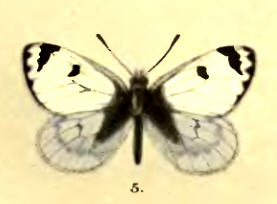
Baltia shawi, the Shaw's dwarf, is a small butterfly of the family Pieridae, that is, the yellows and whites. It is found at high altitudes in Central Asia.

Ixias pyrene, the yellow orange tip, is a small butterfly of the family Pieridae, that is, the yellows and whites, which is found in Sri Lanka, India and southeast Asia.

Hebomoia glaucippe, the great orange-tip, is a butterfly belonging to the family Pieridae, that is the yellows and whites. It is found in the Indomalayan realm and Wallacea.

Pontia chloridice, the lesser Bath white, is a small butterfly of the family Pieridae, that is, the yellows and whites. The species is found in steppe zone of Ukraine, Moldova and Russia; east to Transbaikalia, Mongolia, Korea; south to Balkan Peninsula, Turkey, Transcaucasia, Greater Caucasus, Iran, Northern Pakistan, Central Asia, Kazakhstan.

Colotis vestalis, the white Arab, is a small butterfly of the family Pieridae, that is, the yellows and whites, which is found in India, Pakistan, Iran, Somalia, Ethiopia, Sudan, Kenya and Tanzania. It has a wingspan of 4–5 cm.

Colotis fausta, the large salmon Arab, is a small butterfly of the family Pieridae, that is, the yellows and whites, which is found in Israel, Syria, Turkey, Iran, Afghanistan, Turkmenistan, India, Arabia, Chad, Somalia and United Arab Emirates.

Colotis etrida, the little orange tip, is a species of butterfly in the family Pieridae. It is native to India, Sri Lanka and Pakistan.

Cepora nadina, the lesser gull, is a small to medium-sized butterfly of the family Pieridae, that is, the yellows and whites. The species was first described by Hippolyte Lucas in 1852. It is native to Sri Lanka, India, Myanmar, Hainan, and southeast Asia.

Colotis danae, the crimson tip or scarlet tip, is a small butterfly of the family Pieridae, that is, the yellows and whites. It is found in Asia and Africa.
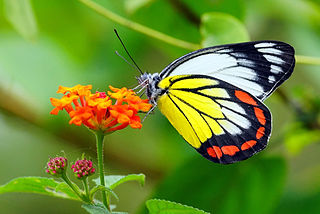
Delias hyparete, the painted Jezebel, is a medium-sized butterfly of the family Pieridae, found in South Asia and Southeast Asia.

Delias pasithoe, the redbase Jezebel is a medium-sized butterfly of the family Pieridae, that is, the yellows and whites. The species is found in parts of South Asia and Southeast Asia. There has been some dispute for which species the specific name aglaja, used twice by Linnaeus in 1758, applies – the redbase Jezebel, or the dark green fritillary, a brush-footed butterfly. Here, Delias pasithoe is used for the redbase Jezebel, based on the replacement name proposed by Linnaeus himself.

Catopsilia pyranthe, the mottled emigrant, is a medium-sized butterfly of the family Pieridae found in south Asia, southeast Asia, and parts of Australia.

Cethosia cyane, the leopard lacewing, is a species of heliconiine butterfly found from India to southern China, and Indochina. Its range has expanded in the last few decades, and its arrival in the southern part of the Malay Peninsula, including Singapore, is relatively recent.

Curetis bulis, the bright sunbeam, is a species of butterfly belonging to the lycaenid family. It is found in Asia.

Nacaduba berenice, the rounded six-line blue, is a lycaenid butterfly found in Indomalayan realm. The species was first described by Gottlieb August Wilhelm Herrich-Schäffer in 1869.
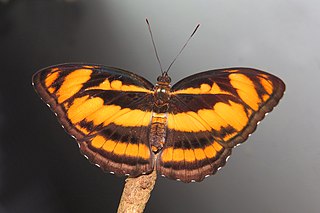
Athyma nefte, the colour sergeant, is a species of brush-footed butterfly found in tropical South and Southeast Asia.

Vindula erota, the common cruiser, is a species of nymphalid butterfly found in forested areas of tropical South Asia and Southeast Asia.
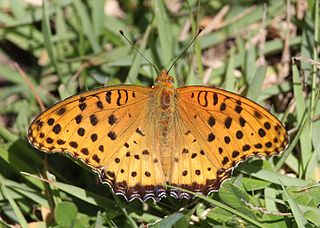
The Indian fritillary is a species of butterfly of the nymphalid or brush-footed family. It is usually found from south and southeast Asia to Australia.
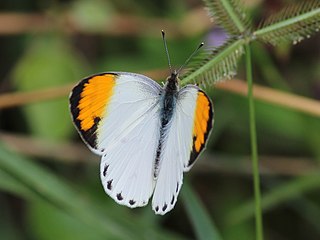
Colotis aurora, the sulphur orange tip or plain orange-tip, is a butterfly in the family Pieridae. It is found in Asia and Africa. The nominate subspecies, Colotis aurora aurora is found in India and Sri Lanka. The other subspecies, Colotis aurora evarne is found in Mauritania, Senegal, the Gambia, Mali, Burkina Faso, Ghana, Benin, Nigeria, Chad, Sudan, Ethiopia, Uganda, Kenya, Rwanda, Tanzania, the Democratic Republic of the Congo, Somalia, and southern Arabia.






















